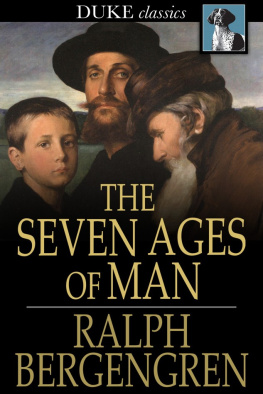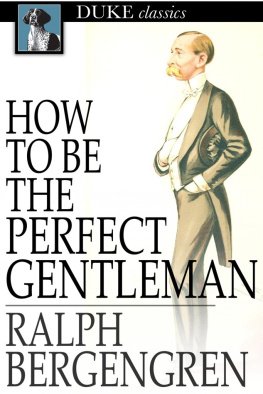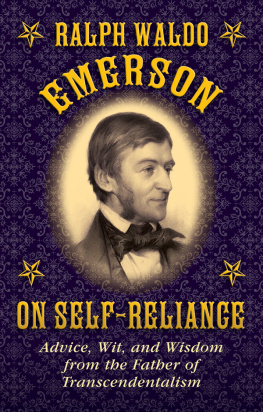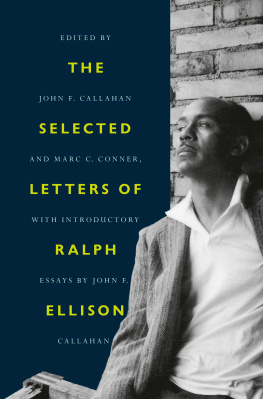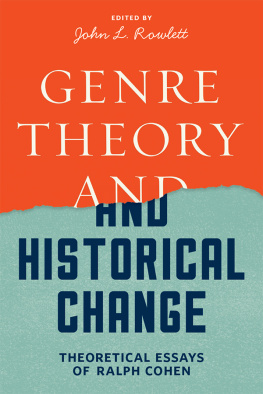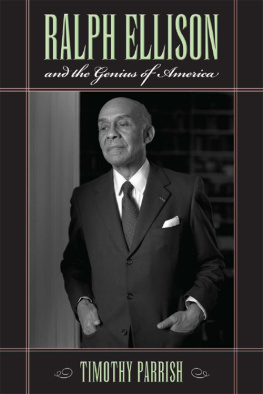Ralph Bergengren - The Seven Ages of Man
Here you can read online Ralph Bergengren - The Seven Ages of Man full text of the book (entire story) in english for free. Download pdf and epub, get meaning, cover and reviews about this ebook. year: 2013, publisher: Duke Classics, genre: Science. Description of the work, (preface) as well as reviews are available. Best literature library LitArk.com created for fans of good reading and offers a wide selection of genres:
Romance novel
Science fiction
Adventure
Detective
Science
History
Home and family
Prose
Art
Politics
Computer
Non-fiction
Religion
Business
Children
Humor
Choose a favorite category and find really read worthwhile books. Enjoy immersion in the world of imagination, feel the emotions of the characters or learn something new for yourself, make an fascinating discovery.
- Book:The Seven Ages of Man
- Author:
- Publisher:Duke Classics
- Genre:
- Year:2013
- Rating:4 / 5
- Favourites:Add to favourites
- Your mark:
- 80
- 1
- 2
- 3
- 4
- 5
The Seven Ages of Man: summary, description and annotation
We offer to read an annotation, description, summary or preface (depends on what the author of the book "The Seven Ages of Man" wrote himself). If you haven't found the necessary information about the book — write in the comments, we will try to find it.
This delightful series of essays and observations has been structured around the cycle of life, moving from infancy and early childhood to the golden years, and touching on every phase in between. With dry wit and keen insight, author Ralph Bergengren offers up an engaging and thought-provoking look at what life is all about.
The Seven Ages of Man — read online for free the complete book (whole text) full work
Below is the text of the book, divided by pages. System saving the place of the last page read, allows you to conveniently read the book "The Seven Ages of Man" online for free, without having to search again every time where you left off. Put a bookmark, and you can go to the page where you finished reading at any time.
Font size:
Interval:
Bookmark:

First published in 1921
ISBN 978-1-62013-338-5
Duke Classics
2013 Duke Classics and its licensors. All rights reserved.
While every effort has been used to ensure the accuracy and reliability of the information contained in this edition, Duke Classics does not assume liability or responsibility for any errors or omissions in this book. Duke Classics does not accept responsibility for loss suffered as a result of reliance upon the accuracy or currency of information contained in this book.
In meeting a baby, one should behave as much as possible like a baby one's self. We cannot, of course, diminish our size, or exchange our customary garments for baby-clothes; neither can we arrive in a perambulator, and be conveyed in the arms, either of a parent or a nursemaid, into the presence of the baby whom we are to meet. The best we can do is to hang, as it were on the hatrack, our preconceived ideas of what manner of behavior entertains a baby, as cooing, grimacing, tickling, and the like, and model our deportment on the dignified but friendly reticence that one baby evinces in meeting another.BABY: HIS FRIENDS AND FOES.
Of the many questions that Mr. Boswell, at one time and another, askedhis friend, Dr. Johnson, I can hardly recall another more searchingthan one that he himself describes as whimsical.
"I know not how so whimsical a thought came into my head," says Boswell,"but I asked, 'If, sir, you were shut up in a castle, and a new-bornchild with you, what would you do?'
"JOHNSON: Why, sir, I should not much like my company.
"BOSWELL: But would you take the trouble of rearing it?
"He seemed, as may be supposed, unwilling to pursue the subject: but,upon my persevering in my question, replied, 'Why, yes, sir, I would;but I must have all conveniences. If I had no garden, I would make ashed on the roof, and take it there for fresh air. I should feed it, andwash it much, and with warm water, to please it, not with cold water, togive it pain.'
"BOSWELL: But, sir, does not heat relax?
"JOHNSON: Sir, you are not to imagine the water is to be very hot. Iwould not coddle the child."
It appears, too, that the Doctor had given some thought to the subject,although never expecting to be a mother himself: his immediateinsistence upon fresh air promises well for the infant, and thefrequency with which he proposes to wash his little companion indicatesthat, so long as the water-supply of the castle lasted, he would havedone his part. A cow in the castle seems to have been taken for granted;but, in 1769, even Dr. Johnson would have known little or nothing aboutformulas, nor would it have occurred to him to make a pasteurizingapparatus, as so many parents do nowadays, out of a large tin pail and apie-plate. Here the baby would have had to take his eighteenth-centurychance. And I wish, too, that he might have had a copy of "The Baby'sPhysical Culture Guide," that modern compendium of twenty-fourexercises, by which a reasonably strongarmed mother may strengthen anddevelop the infant's tiny muscles; for I like to think of Dr. Johnsonexercising his innocent companion in his shed on the roof. "Sir," hesays, "I do not much like my employment; but here we are, and we'll haveto make the best of it."
Such an experience, no doubt, would have been good for Dr. Johnson, andgood for the baby (if it survived). "That into which his little mind isto develop," says "The Baby's Physical Culture Guide," "is plasticlikea wax record, ready to retain such impressions as are made upon it"; andon this wax some, at least, of the impressions left by Dr. Johnson musthave been valuable. But on the real mystery of babyhoodthe insolubleenigma that the "Guide" can only in small measure dispose of bycomparing the rearing of an infant with the home-manufacture of a recordfor the gramaphonethe experience would have thrown no light.
The Doctor, I dare say, would have written a paper on the feeding andwashing of infants, and later dictionaries of familiar quotation mightperhaps have been enriched by the phrase,"'The baby is grandfather tothe man.'JOHNSON." But of this grandfather the man has no memory. Hisbabyhood is a past concerning which he is perforce silent, a time whenit is only by the report of others that he knows he was living. Hislittle mind seems to have been more than a little blank; and althoughgifted novelists have set themselves the imaginative task of thinkingand writing like babies, none, in my reading, has ever plausiblysucceeded. The best they can do is to think and write like littleadults. I recall, for example, the honest effort of Miss May Sinclair,whom I greatly respect as an adult, to see Mr. Olivier through the eyesof his baby daughter Mary. "Papa sat up, broad and tall above the table,all by himself. He was dressed in black. One long brown beard hung downin front of him and one short beard covered his mouth. You knew he wassmiling because his cheeks swelled high up in his face, so that his eyeswere squeezed into narrow, shining slits. When they came out again, yousaw scarlet specks and smears in their corners." A fearsome Papa!and,although I have no way of knowing that fathers do not presentthemselves in this futurist aspect to their helpless offspring, I amglad to think otherwise. At all events a baby is, and must be, well usedto living in Brobdingnag.
It would be a surprising thing, if it were not so common, that a manshows so little curiosity about this forgotten period of his life. Butsuch curiosity would be impossible to satisfy. Existing photographs ofhim at that time are a disappointment: he seldom admits seeing anyresemblance, and, if he does, the likeness rarely, if ever, gives himany visible satisfaction. Nor can anything of real and personal interestbe found out by interviewing those who then knew him. Of a hundred, nay,of a thousand or a million babies,and though I cannot speak as awoman, it seems to me (except, perhaps, for a livelier interest andpleasure among them in their infant appearance) that everything I amsaying applies equally to babies of that fascinating sex,the trivialdetails observed by those who are nearest them are practicallyidentical. They thump their heads. They chew their fingers. They try tofeed their toes; and, sillier yet, they try to feed them with thingsthat are obviously inedible. And so forth. And so forth. If Dr. Johnson,actually shut up in a castle, and a new-born child with him, had kept arecord, the result would have been very much like the records thatmothers now keep in what, unless I am mistaken, are called "Baby Books."If you've seen one Baby Book, as the cynical old man said aboutcircuses, you've seen all of 'em.
Nor does any man take pleasure in preserving and reading over his ownBaby Book. Hercules, to be sure, might have been interested to read inhis mother's handwriting,"Tuesday. An eventful day. Two big, horridSnakes came in from the garden, and got in Darling's cradle, frighteningNurse into hysterics; but Darling only cooed and strangled them bothwith his dear, strong little hands. He gets stronger and cunninger everyday. When the horrid Snakes were taken away from him, he cried and said,'Atta! Atta!'"
But Hercules was an exceptionally interesting baby; and the average BabyBook records nothing that a grown man can regard with pride, and much,if he has any sensitiveness at all, that must make him blush. Nothingbut respect for his mother, it is almost safe to say, would withhold himfrom hurrying the incriminating document to the cellar, and cremating itin the furnace.
Font size:
Interval:
Bookmark:
Similar books «The Seven Ages of Man»
Look at similar books to The Seven Ages of Man. We have selected literature similar in name and meaning in the hope of providing readers with more options to find new, interesting, not yet read works.
Discussion, reviews of the book The Seven Ages of Man and just readers' own opinions. Leave your comments, write what you think about the work, its meaning or the main characters. Specify what exactly you liked and what you didn't like, and why you think so.

